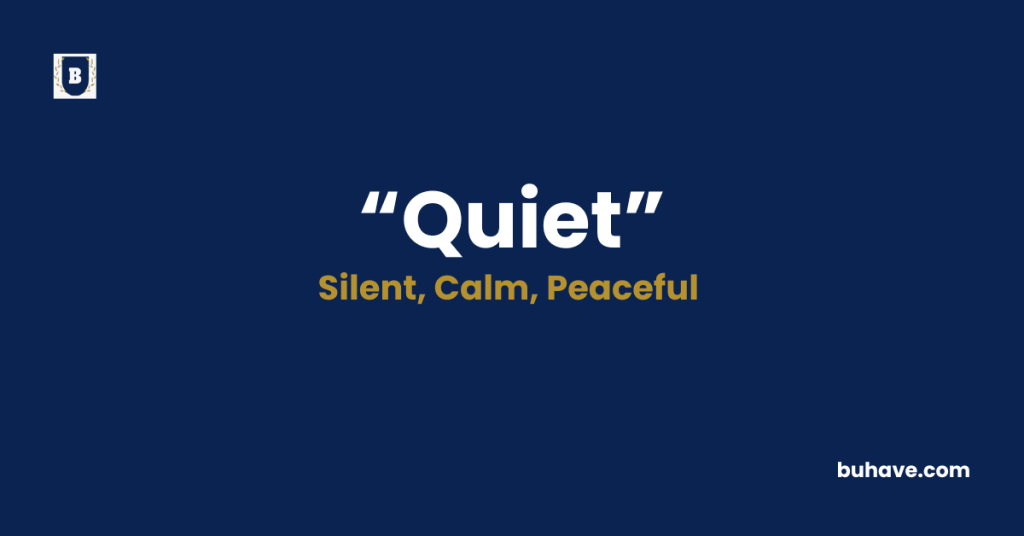The word ‘Quiet’ (Noun) describes the absence of noise, disturbance, or activity, often creating a calm, peaceful, and undisturbed atmosphere. in this guide, you’ll learn the full definition, synonyms, antonyms, etymology, and real-life examples of how to use ‘Quiet’ correctly in sentences.
Quiet Explained in Depth
A complete and detailed guide to the words Quiet including meaning, definition, examples, etymology, synonyms, and antonyms.
Meanings of Quiet
Quiet means staying calm, peaceful, and free from noise or disturbance. When someone is quiet, they choose to speak less, move gently, or avoid creating distractions. Rather than drawing attention, a quiet person often prefers to observe, listen, and reflect.
Furthermore, a quiet place usually feels soothing and calm because it allows people to relax, concentrate, or feel at ease. So, instead of being loud or chaotic, quiet situations or people tend to offer a sense of stillness and calm energy.
Definition:
it refers to the absence of noise, disturbance, or activity, often creating a calm, peaceful, and undisturbed atmosphere. It can describe an environment, behavior.
The word “quite” is an adverb that people often use in everyday conversation to express the degree or intensity of something. Interestingly, its meaning can change depending on where and how it’s used. In American English, “quite” usually emphasizes something strongly—like saying, “That’s quite amazing,” meaning it’s very impressive. On the other hand, in British English, “quite” often softens the meaning. For example, saying “She’s quite nice” might mean she’s somewhat nice, not extremely.
Additionally, “quite” can also mean completely in certain contexts, especially when paired with words like sure, certain, or wrong—for instance, “I’m quite sure” means absolutely sure. Overall, “quite” is a flexible word that helps add precision or subtlety to what you’re saying, and its meaning often depends on tone and context.
Etymology:
The word “quiet” has deep and steady roots in language history. At first, it appeared in Middle English as “quiet” around the 14th century, coming from Old French. Originally, the Old French word “quiet” meant “calm” or “peaceful,” capturing the same feeling we associate with the word today. Before that, the Old French borrowed it from the Latin word “quietus,” which means “at rest” or “peaceful.” In addition, Latin used “quies” (meaning “rest” or “sleep”) to describe the state of being still and undisturbed.
As the centuries passed, English speakers kept the core meaning alive, always linking “quiet” to calmness, stillness, and a gentle absence of noise. Today, when we say “quiet,” we still connect to those ancient ideas of peace, calm, and restfulness that people valued long ago.
Example Sentence:
- Although it was raining, the view from the hilltop was quite beautiful and worth the hike.
- She was quite certain about her decision; therefore, no one could convince her otherwise.
- Interestingly, the movie was quite different from what I had expected.
- After all, he’s quite talented, especially when it comes to solving complex problems quickly.
Quite Synonyms:
Quiet Antonyms:
- Loud
- Noisy
- Boisterous
- Clamorous
- Rowdy
- Raucous
- Deafening
- Turbulent
- Obnoxious
- Thunderous
FAQs about Quiet:
Here are some Frequently Asked Questions (FAQs) about the word “Quiet”
1. What does “quiet” mean in simple terms?
Answer: “Quiet” means not making much noise, staying calm, or being peaceful.
2. Is “quiet” the same as “silent”?
Answer: Not exactly. “Silent” means no sound at all, while “quiet” can mean very little noise or calmness, not complete silence.
3. Can “quiet” describe a person?
Answer: Yes, when we say someone is quiet, we usually mean they speak softly or not often, and they may prefer listening or being alone.
4. Is “quiet” always a good thing?
Answer: Often, yes—it can mean peace, calm, or focus. However, in some situations, being quiet might feel uncomfortable, like during an awkward silence.
5. What part of speech is “quiet”?
Answer: “Quiet” is usually used as an adjective, but it can also be a verb (e.g., “She tried to quiet the baby”) or a noun (e.g., “I enjoy the quiet of the morning”).
6. What is the opposite of “quiet”?
Answer: Words like “loud,” “noisy,” or “boisterous” are common antonyms of “quiet.”
7. Can “quiet” refer to emotions or moods?
Answer: Yes, people often use “quiet” to describe a peaceful or gentle emotional state, such as “a quiet confidence” or “a quiet sadness.”

















